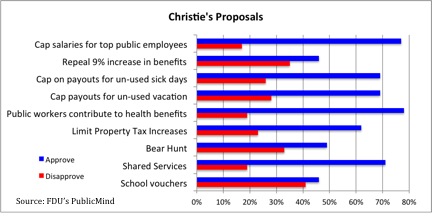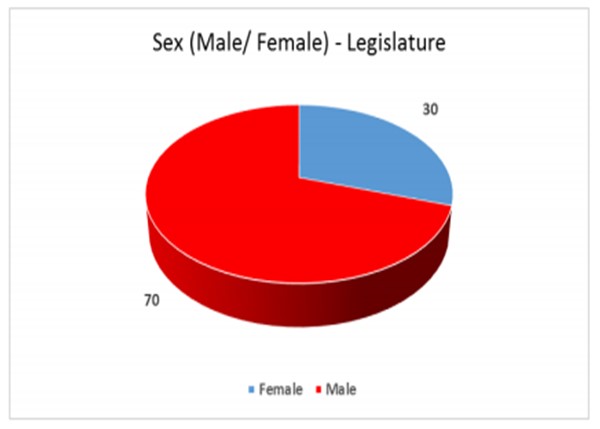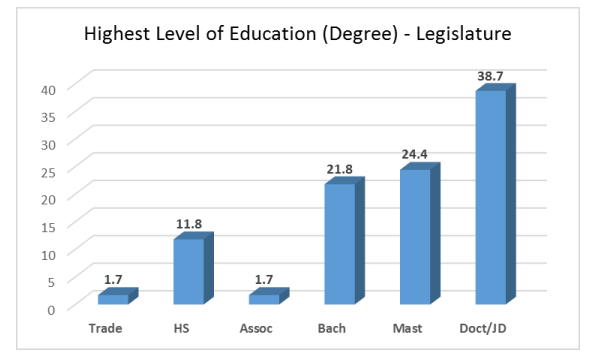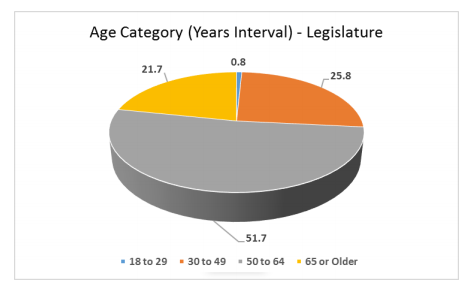New Jersey Government and Party Politics
New Jersey has three primary government branches; that is, the executive, the judiciary and the legislative. The governor is the head of the executive branch. Notably, the governor makes most of the government appointments, which the legislature approves. In particular, the judiciary branch makes decisions regarding the constitution of New Jersey and state laws. The Republican Party and Democratic Party are the only dominant parties in New Jersey. This presentation reviews New Jersey’s party politics, election and campaign process as well as the legislative organization and procedure.
Political Party Structure/ Make Up
In New Jersey, the main political parties are Republican Party and Democratic Party. The New Jersey Democratic State Committee (NJDSC) governs the Democratic Party in the state. In particular, NJDSC is made of 13 officials. The leadership of NJDSC includes a chairperson, a vice-chairperson, a secretary and a treasurer (New Jersey Democratic State Committee [NJDSC], 2013). Again, the state has 21 Democratic County Chairs elected from each district.
On the other hand, New Jersey Republican State Committee governs Republican Party in the state. The leadership of this organ includes a chairperson, vice chairperson, treasurer, national committeeman, committeewoman, finance chairperson, and executive director (New Jersey Republican Party [NJGOP], 2016). The committee has 42 members, a male and female member from each district.
Types of Primaries in New Jersey
In New Jersey, both Democrats and Republicans rely on closed and mixed primary processes. On congressional and state primaries, both parties rely on mixed processes. In this case, registered members of the Democratic Party can participate in the Republican Party primaries and vice versa (Open Primaries, 2015). On the other hand, both the Republican Party and the Democratic Party advocate for closed presidential primaries. In short, presidential candidates are nominated through primaries whereby only registered party members participate.
New Jersey Party Organizations
The main political parties in New Jersey are Democratic Party and Republican Party. The Democratic Party organization in New Jersey is governed by New Jersey Democratic State Committee (NJDSC) (New Jersey Democratic State Committee [NJDSC], 2013). NJDSC has an executive committee which constitutes four officials namely, the chairperson, vice chairperson, secretary and treasurer. Currently, the chairperson is a male; while, the other three executive officials are females (NJDSC, 2013).
The Republican Party organization in New Jersey is governed by New Jersey Republican State Committee. Each district provides two members (a female and male) to the New Jersey Republican State Committee (New Jersey Republican Party [NJGOP], 2016). New Jersey Republican State Committee is under the leadership of Chairperson; however, the highly recognized GOP leadership in New Jersey is made of the elected officials starting with the governor, lieutenant governor, Senate Republican leader, and Assembly Republican leader.
New Jersey Government Structure
The government structure of New Jersey is made of three main branches that include the executive, the judiciary, and the legislature. The executive branch constitutes the office of the governor and departments (The State of New Jersey, 2016). The Governor is the chief of the executive branch. Mainly, the departments include Agriculture, Corrections, Higher Education Institutions, Law and Public Safety, Banking and Insurance, Education, Sate and Public Defender, Human Services, Military and Veteran’s Affairs, Transportation, Commerce and Economic Development, Environmental Protection, Personnel, Treasury, Community Affairs, Health and Labor.
On the judicial branch, New Jersey has Supreme Court, Superior Court, and Tax Court. Mainly, this branch makes decisions regarding the application of the state laws (The State of New Jersey, 2016). The Senate approves judges after their appointment by the governor. The state Supreme Court, the highest court in the state, hears cases relating to constitutional problems. The Supreme Court is made of the chief justice and six associate justices (The State of New Jersey, 2016). In particular, the chief justice supervises the court workers and clerks, investigates complaints raised against the court, and oversees the finances of the court.
The legislative branch constitutes the Senate and the General Assembly. The Senate has 40 members, each elected from the state’s 40 districts (The State of New Jersey, 2016). The Senate is under the leadership of Senate President. On the other hand, the General Assembly has 80 members, two members elected from each district. The Speaker heads the General Assembly. Both chambers are based in the State House in Trenton (The State of New Jersey, 2016). The role of the legislature is to make laws and propose amendments to the constitution of the state.
Campaign Methods of a State Candidate/ Incumbent

The incumbent governor of New Jersey is Chris Christie. He was elected in 2009 and re-elected in 2013. His campaign methods were based on promoting personal image through the media and issues affecting the people of the state. Notably, Chris Christie capitalized on Hurricane Sandy in 2012 to gain media attention by accompanying President Obama to comfort survivors and survey the damage (Aguzino, 2014). Mainly, this act portrayed him as a person with a sense of bipartisanship and compassion. Again, Christie proposals through campaign rallies and online platforms played a huge role. For instance, the governor promised the electorate that he would not raise taxes (Topaz, 2015). Again, Christie vowed to lower business taxes and state income.
On Education, Christie promised to grant tax credits to individuals who took their kids to parochial and private schools (Woolley & Cassino, 2012). Besides, Christie supported state-funded vouchers for parents to use in paying tuition for their children in private schools or public schools. Again, the governor recommended merit payment for schoolteachers.
Christie campaign vowed to embrace government reduction. According to him, New Jersey Department of Environment Protection was too large and at the same time killing businesses through indiscriminate fines and delays in the issuance of permits. On immigration, Christie advocated for secure border citing the discussion of legalizing individuals who came to the US unlawfully as premature. He compared the act of being in the country without proper documentation as civil wrong rather than a crime. Thus, he advocated for proper documentation of foreign nationals.
On same-sex marriages, Christies upholds New Jersey law that empowers same-sex couples to establish civil unions. However, he vowed to veto all bills advocating for the legalization of same-sex marriage in New Jersey (Zernike, 2012). On a different vein, Christie is a pro-life campaigner; that is, he is against abortion.
Make Up of New Jersey Legislature: Gender

- Legislative Gender %
- Male = 30%
- Female = 70%
- State Senate
- Men = 29 members
- Women = 11 members
- General Assembly
- Men = 25 members
- Women 55 members
The state Senate of New Jersey has 40 members. On the other hand, the state General Assembly has 80 members. Regarding gender, the state Senate and General Assembly have 11 and 25 female members respectively (National Conference of State Legislatures [NCSL], 2016). In this regard, 30 percent of legislative members are women, and the rest are men.
Make Up of New Jersey Legislature: Profession

- Bachelor’s = 85%
- Masters = 24%
- Doctorate/ law = 39%
- County college = 2%
- High school or trade school = 14%
Mainly, 85% of New Jersey’s legislators have at least bachelor’s degree. Notably, 24% and 39% of the lawmakers have masters and doctorate (or law) degree (Hughes, 2015). Further, 2% have attended county college. Finally, 4% of New Jersey lawmakers have attained high school or trade school diplomas.
Make Up of New Jersey Legislature: Age

- Median age = 56 years
- 26% aged 30-49 years
- 52% aged 50-64 years
- 22% aged 65 and above
The median age of all legislators is 56 years. Notably, 52% of lawmakers are aged between 50 years and 64 years (Hughes, 2015). Approximately, 26% are aged 30 years and 49 years; while, 22% are aged 65 years and above. The oldest legislator (a senator) is aged 82 years, while the youngest lawmaker (an assemblyman) is aged 30 years.
Apportioning and Districting in New Jersey
Based on New Jersey Constitution, Apportionment Commission is responsible for redrawing the boundaries of 40 legislative districts out of which 40 senators and 80 assembly members represent (Apportionment Commission, n.d.). The legislative redistricting is undertaken after 10 years to consider population changes within geographical boundaries of the state. The redrawing of districts is meant to promote equality in democratic representations among New Jersey residents. Notably, the legislative redistricting process takes place after the US federal decennial census. Mainly, this census provides raw geographic and demographic data out of which legislative districts are established (Apportionment Commission, n.d.). The US constitution uses the census to apportion House of Representatives members but does not provide a guide on how to establish legislative districts. In New Jersey, the Apportionment Commission creates the redistricting map. According to Apportionment Commission (n.d.), “the Commission [initially] consists of 10 members appointed in equal numbers by the chairmen of the State committees of each of the two political parties whose candidates for Governor received the largest number of votes in the most recent gubernatorial election” (para. 5). In the case of a disagreement on the map, Chief Justice of the New Jersey Supreme Court appoints the 11th commissioner.
Legislative Institutionalization of the State
By definition, legislative institutionalization is “process by which legislatures acquire a definite way of performing their functions that set them apart” (Hahn, 1996). In particular, a highly institutionalized legislature is hard to impose changes. In New Jersey, legislative institutionalization is based on three aspects; that is, shared norms, continuity of personnel and managerial autonomy. Legislators in New Jersey serve for longer periods due to the absence of term limits. According to Salmore (2013), legislators in New Jersey have “developed shared rules of the game, of which perhaps the most important [is] cooperation on critical elements of both governing and campaigning” (p. 181). Notably, majorities of moderate members, both Democrats and Republicans have made pacts to enact necessary legislations that would benefit every legislator. For instance, New Jersey lawmakers have overwhelmingly agreed to ignore practices that involve their careers like Christmas budgetary items for each district and dual office holding (Salmore, 2013). Again, there is no ballot initiative to limit the control of the legislators’ policy and procedures. In retrospect, New Jersey legislature is highly institutionalized.
Party Issues in New Jersey
In New Jersey, both Republicans and Democrats have party issues. For instance, New Jersey GOP aims at creating jobs and building the economy by reducing business regulations and lowering taxes (Marcus, 2015). Again, the state GOP pursues the renewal of American values through public policy, taxation, education, welfare and healthcare. Further, New Jersey GOP promotes the upholding of constitutional government by considering all forms of discrimination as immoral and unacceptable. On the other hand, the Democratic Party in New Jersey advocates for increased income taxes particularly on corporation businesses and millionaires (Marcus, 2015). Again, the party advocates for the greater state budget to realize stable pension scheme, and, well-funded higher education, health and wellness, women health, and safety programs.
References
Aguzino, C. (2014). After the storm: Analyzing Chris Christie’s use of Hurricane Sandy in New Jersey’s gubernatorial elections. Critique: A Worldwide Student Journal of Politics, 6(12), 44-65.
Apportionment Commission. (n.d.). New Jersey Apportionment Commission.
Hahn, J. W. (1996). Democratization in Russia: The development of legislative institutions. Armonk, New York: M.E. Sharpe.
Hughes, W. J. (2015). New Jersey state legislature: A demographic profile. Galloway, NJ: Stockton University.
Marcus, S. (2015). N.J. Democrats’ budget, tax increases, moving through Legislature. NJ.com.
National Conference of State Legislatures (NCSL). (2016). Women in state legislatures for 2015.
New Jersey Democratic State Committee (NJDSC). (2013). Our party: NJDSC executive committee. Web.
New Jersey Republican Party (NJGOP). (2016). Leadership. Web.
Open Primaries. (2015). Primary elections state by state: New Jersey.
Salmore, B. G. (2013). New Jersey politics and government: The suburbs come of age (4th ed.). New Brunswick, New Jersey: Rutgers University Press.
The State of New Jersey. (2016). About NJ government.
Topaz, J. (2015). Christie: ‘No new taxes’ in New Jersey. Politico.
Woolley, P. J., & Cassino, D. (2012). Dirty little secrets of Chris Christie: It’s not the personality, numb nuts. Huffpost Pollster.
Zernike, K. (2012). Christie keeps his promise to veto gay marriage bill. The New York Times.
